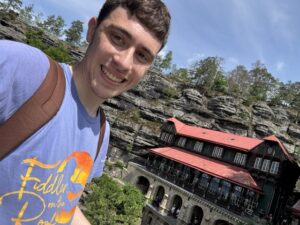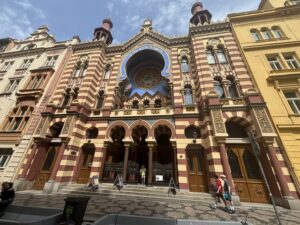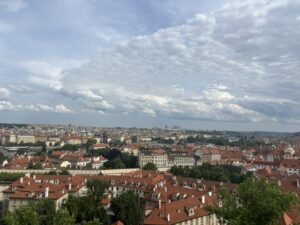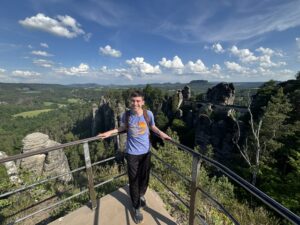- About Ramapo
- Academics
- Admissions & Aid
- Student Life
- Athletics
- Alumni
- Arts & Community
- Quick Links
- Apply
- Visit
- Give
Beyond Campus: Roadrunners Learn History in Prague

November 5, 2025
by Elizabeth Mendicino ‘26
Sometimes, all you need is a change of scenery to shift your perspective. For ten Ramapo College of New Jersey students, this opportunity arose this past May via a trip to Prague, Czech Republic.
The trip, conducted by the Center for Holocaust and Genocide Studies (CHGS), gave students the chance to live outside of their daily routines for 10 days and explore a vibrant and richly historical city. The unique study abroad experience cultivated an immersive insight into the histories and contemporary experiences of Czech Jewish, Roma, and LGBTQIA+ populations.
The group was accompanied by the director of CHGS, Dr. Jacob Labendz, who is an expert in Czech and Jewish history. Labendz considers Prague a second home, and was ecstatic to share with the students not only his vast knowledge, but his love for the places they travelled.
“When you return, you can see your own culture and your own country with new eyes,” said Labendz. “You realize that these things that we take for granted and with which we may struggle, are the product of choices that we’ve made, perhaps not individually, right? I’m not here to blame individuals, but the structures of our country, our culture, our society, our choices we make collectively, even if we don’t individually have a lot of power to change it.”

The trip included a visit to Jubilee Synagogue, a historic and active synagogue on Jerusalem Street in Prague.
Labendz works to integrate the crucial topics that fall under Holocaust and Genocide Studies beyond the curriculum and into the fabric of students’ global understanding.
The experience included visits to sites of mass atrocity; reflections on the histories and cultures of minority groups before, during, and after the Second World War; meetings with non-governmental organizations active in the fields of human rights and representing marginalized communities; discussions with locals; and an impressive array of expert-led tours and museum visits. Most days began with a lecture either from Labendz or a well-versed local scholar.
For the majority of the group, the former Romani work camp Lety u Píscu was the most impactful place. “It eventually became a pig farm and then they eventually turned it back into a memorial, but it was very [impactful],” said Noah Feldman ‘27, an English and literary studies major, from Old Bridge, NJ. “There was a circle where you walked around, and it said all the names of the people who died and surrounding it was a beautiful field of flowers. It was probably the most impactful day that we spent there relating to the Holocaust.”
The trip involved excursions across Prague and the Czech Republic. Students were able to meet local scholars and learn from not only them, but from the places themselves. “It put me in a place where I was able to actually see it, see where they were during [the Holocaust],” said Larissa Beattie ‘27, an elementary education major, from Green Brook, NJ. “Obviously, we learned about the Holocaust and we learned about all the terrible events that happened, but being in a city and being on landmarks [those] events were happening on was really impactful and made it more of a reality. Obviously, it’s real and it happened, but being there and experiencing and walking through certain places just made it different.”
Each place held a different memory, and held significance for a different marginalized group. The students were able to contextualize the knowledge they had in a more tangible way, taking the learning beyond the books and helping it come alive before them.
“You can know about the Holocaust, but once you actually visit a concentration camp, you start to really see more,” said Feldman. “We got to see pictures drawn by children during the Holocaust… you can understand everything more by seeing it.”
As a liberal arts institution, experiential learning opportunities like this are a cornerstone of what sets Ramapo apart. Learning from those in communities directly impacted by the Holocaust in the places where history took place gives students a once in a lifetime opportunity to truly experience what they are learning. It enables students to learn and grow on an unmatched level, leaving a profound impact on them that will stay with them for the rest of their lives.
The CHGS was able to provide a $1,400 scholarship to each participant, thanks to generous donations from Beth Haverim Shir Shalom in Mahwah, NJ, Congregation Rodeph Sholom in Bridgeport, CT, Rosalyn Ross, and an anonymous donor. Additionally, the S. Rubenstein Family Foundation offered a $3,000 scholarship to one of the participants.
The trip was planned in coordination with Dr. Erin Augis, professor of psychology and director of the Honors Program, and support from Dr. Paul Current, director of study abroad, and Kathryn Lamanna, assistant director of interracial education, both of whom work out of Ramapo’s Roukema Center for International Education.
Students earned two credits for participating, and honors students had the option of utilizing the program to fulfill a portion of their research and writing requirements. For information on the upcoming 2026 trip, visit the CHGS website or email holgen@gmail.com.
Copyright ©2026 Ramapo College Of New Jersey | Statements And Policies | Accessibility | Contact Webmaster.



Follow Ramapo